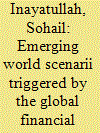| Srl | Item |
| 1 |
ID:
099094


|
|
|
| 2 |
ID:
074956


|
|
|
|
|
| Publication |
2006.
|
| Summary/Abstract |
By the end of 2001, Argentina faced economic recession, a collapse in its banking system, and an external sovereign debt crisis. While preemptive action earlier in the year might have made one or more of these crises less severe, preemption was a political orphan at home and abroad. The country's long-standing relationship with the International Monetary Fund brought with it a mutual dependence: the IMF had come to embrace Argentina as a symbol of the success of its policy advice, and Argentina had come to rely on the IMF's endorsement and occasional financial support to navigate the choppy international markets. That relationship deepened along with Argentina's growing difficulties in the run-up to default. IMF support was used to put off a correction of the overvalued currency and debt restructuring. A new Argentine policy regime and a new, more adversarial relationship with the IMF emerged only after devaluation and default.
|
|
|
|
|
|
|
|
|
|
|
|
|
|
|
|
| 3 |
ID:
131885


|
|
|
|
|
| Publication |
2014.
|
| Summary/Abstract |
This article explores why the Japanese government did not decisively intervene on behalf of bank bailouts at the early stage of the banking crisis of 1997-98 and investigates the institutional and political context behind the use of fiscal money for bank bailouts in 1997-98, 1998-99, and 2001-05. In contrast with prevailing views, which emphasize the conflicts of interest or differences in policy preferences between politicians and bureaucrats and their captured nature either by bankers' special interests or political/bureaucratic interests, this article argues that Japanese policymakers shared a congruent policy preference - that is, minimizing the disruptions in the existing institutional arrangement in government-bank-firm relations and this congruence in policy preference (or 'cognitive capture') compelled the government to take a creditor-centered approach to the banking problem - i.e., letting banks resolve their own problems. It also argues that a strong political leadership that can break with the 'cognitive capture' and sustain government's resolute commitment to solving the nonperforming loan problem is an essential factor for successful bank restructuring.
|
|
|
|
|
|
|
|
|
|
|
|
|
|
|
|
| 4 |
ID:
095285


|
|
|
|
|
| Publication |
2010.
|
| Summary/Abstract |
The banking crisis of 2007-2008 briefly threatened to overturn a system of market government that had lasted for nearly three decades-a system designed to minimise democratic control over markets. The crisis drew politicians once more into financial politics and exposed bankers and banking institutions to popular criticism and control. But the development of regulatory debates, and of the institutions designed to manage the crisis, have combined to avert this threat to the established order. The crisis is being 'wasted': it is failing to produce radical reforms. The paper establishes the intellectual and institutional origins of this failure, and argues that, while the reform window is closing, it is not yet fully shut: there exists yet scope for radical argument and popular mobilisation in the creation of a financial system with fewer pathological features.
|
|
|
|
|
|
|
|
|
|
|
|
|
|
|
|